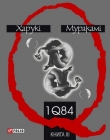
Текст книги "1q84"
Автор книги: Haruki Murakami
Жанр:
Современная проза
сообщить о нарушении
Текущая страница: 79 (всего у книги 81 страниц)
CHAPTER 29
Aomame
I’LL NEVER LET GO OF YOUR HAND AGAIN
“Tengo, open your eyes,” Aomame whispered. Tengo opened his eyes. Time began to flow again in the world.
“There’s the moon,” Aomame said.
Tengo raised his face and looked up at the sky. The clouds had parted and above the bare branches of the zelkova tree he could make out the moons. A large yellow moon and a smaller, misshapen green one. Maza and dohta. The glow colored the edges of the passing clouds, like a long skirt whose hem had been accidentally dipped in dye.
Tengo turned now to look over at Aomame sitting beside him. She was no longer a skinny, undernourished ten-year-old girl, dressed in ill-fitting hand-me-downs, her hair crudely trimmed by her mother. There was little left of the girl she had been, yet Tengo knew her at a glance. This was clearly Aomame and no other. Her eyes, brimming with expression, were the same, even after twenty years. Strong, unclouded, clear eyes. Eyes that knew exactly what they longed for. Eyes that knew full well what they should see, and weren’t going to let anyone get in her way. And those eyes were looking right at him. Straight into his heart.
Aomame had spent the last twenty years somewhere unknown to him. During that time, she had grown into a beautiful woman. Instantly and without reservation, Tengo absorbed all those places, and all that time, and they became a part of his own flesh and blood. They were his places now. His time.
I should say something, Tengo thought, but no words would come. He moved his lips, just barely, searching for proper words in the air, but they were nowhere to be found. All that came out from between his lips were swirls of white breath, like a wandering solitary island. As she gazed into his eyes, Aomame gave a slight shake of her head, just once. Tengo understood what that meant. You don’t have to say a thing. She continued to hold his hand inside his pocket. She didn’t let go, not even for a moment.
“We’re seeing the same thing,” Aomame said quietly as she gazed deep into his eyes. This was, at once, a question and a confirmation.
“There are two moons,” Aomame said.
Tengo nodded. There are two moons. He didn’t say this aloud. For some reason his voice wouldn’t come. He just thought it.
Aomame closed her eyes. She curled up and pressed her cheek against his chest. Her ear was right above his heart. She was listening to his thoughts. “I needed to know this,” Aomame said. “That we’re in the same world, seeing the same things.”
Tengo suddenly noticed that the whirling pillar rising up inside him had vanished. All that surrounded him now was a quiet winter night. There were lights on in a few of the windows in the apartment building across the way, hinting at people other than themselves alive in this world. This struck the two of them as exceedingly strange, even as somehow illogical—that other people could also exist, and be living their lives, in the same world.
Tengo leaned over slightly and breathed in the fragrance of Aomame’s hair. Beautiful, straight hair. Her small, pink ears peeped out like shy little creatures.
It was such a long time, Aomame thought.
It was such a long time, Tengo thought too. At the same time, though, he noticed how the twenty years that had passed now held no substance. It had all passed by in an instant, and took but an instant to be filled in.
Tengo took his hand out of his pocket and put it around her shoulder. Through his palm he could feel the wholeness of her body. He raised his face and looked up at the moons again. Through breaks in the clouds, the odd pair of moons was still bathing the earth in a strange mix of color. The clouds made their way leisurely across the sky. Under that light, Tengo once again keenly felt the mind’s ability to relativize time. Twenty years was a long time. But Tengo knew that if he were to meet Aomame in another twenty years, he would feel the same way he did now. Even if they were both over fifty, he would still feel the same mix of excitement and confusion in her presence. His heart would be filled with the same joy and certainty.
Tengo kept these thoughts to himself, but he knew that Aomame was listening carefully to these unspoken words. Her little pink ear pressed against his chest. She was hearing everything that went on in his heart, like a person who can trace a map with his fingertip and conjure up vivid, living scenery.
“I want to stay here forever and forget all about time,” Aomame said in a small voice. “But there’s something the two of us have to do.”
We have to move on, Tengo thought.
“That’s right, we have to move on,” Aomame said. “The sooner the better. We don’t have much time left. Though I can’t yet put into words where we’re going.”
There’s no need for words, Tengo thought.
“Don’t you want to know where we’re going?” Aomame asked.
Tengo shook his head. The winds of reality had not extinguished the flame in his heart. There was nothing more significant.
“We will never be apart,” Aomame said. “That’s more clear than anything. We will never let go of each other’s hand again.”
A new cloud appeared and gradually swallowed up the moons. The shadow enveloping the world grew one shade deeper.
“We have to hurry,” Aomame whispered. The two of them stood up on the slide. Once again their shadows became one. Like little children groping their way through a dark forest, they held on tightly to each other’s hand.
“We’re going to leave the cat town,” Tengo said, speaking aloud for the first time. Aomame treasured this fresh, newborn voice.
“The cat town?”
“The town at the mercy of a deep loneliness during the day and, come night, of large cats. There’s a beautiful river running through it, and an old stone bridge spanning the river. But it’s not where we should stay.”
We call this world by different names, Aomame thought. I call it the year 1Q84, while he calls it the cat town. But it all means the same thing. Aomame squeezed his hand even tighter.
“You’re right, we’re going to leave the cat town now. The two of us, together,” Aomame said. “Once we leave this town, day or night, we will never be apart.”
As the two of them hurried out of the park, the pair of moons remained hidden behind the slowly moving clouds. The eyes of the moons were covered. And the boy and the girl, hand in hand, made their way out of the forest.
CHAPTER 30
Tengo
IF I’M NOT MISTAKEN
After they left the park, they walked out onto the main street and hailed a cab. Aomame told the driver to take them to Sangenjaya, via Route 246.
For the first time, Tengo noticed what Aomame was wearing. She had on a light-colored spring coat, too thin for this cold time of year. The coat was belted in front. Underneath was a nicely tailored green suit. The skirt was short and tight. She had on stockings and lustrous high heels, and carried a black leather shoulder bag. The bag was bulging and looked heavy. She wasn’t wearing any gloves or a muffler, no rings or necklace or earrings, no hint of perfume. To Tengo, what she had on, and what she had omitted, looked entirely natural. He could think of nothing that needed to be added or removed.
The taxi sped down Ring Road 7 toward Route 246. Traffic was flowing along unusually smoothly. For a long time after they got in the taxi, the two of them didn’t speak. The radio in the taxi was off, and the young driver was very quiet. All the two of them heard was the ceaseless, monotonous hum of tires. Aomame leaned against Tengo, still clutching his large hand. If she let go she might never find him again. Around them the night city flowed by like a phosphorescent tide.
“There are several things I need to say to you,” Aomame said, after a while. “I don’t think I can explain everything before we arrive there. We don’t have that much time. But maybe if we had all the time in the world I still couldn’t explain it.”
Tengo shook his head slightly. There was no need to explain everything now. They could fill in all the gaps later, as they went—if there were indeed gaps that needed to be filled. Tengo felt that as long as it was something the two of them could share—even a gap they had to abandon or a riddle they never could solve—he could discover a joy there, something akin to love.
“What do I need to know about you at this point?” Tengo asked.
“What do you know about me?” Aomame asked in return.
“Almost nothing,” Tengo said. “You’re an instructor at a sports club. You’re single. You’ve been living in Koenji.”
“I know almost nothing about you, too,” Aomame said, “though I do know a few small things. You teach math at a cram school in Yoyogi. You live alone. And you’re the one who really wrote Air Chrysalis.”
Tengo looked at her face, his lips parted in surprise. There were very few people who knew this about him. Did she have some connection with the cult?
“Don’t worry. We’re on the same side,” she said. “If I told you how I came to know this, it would take too long. But I do know that you wrote Air Chrysalis together with Eriko Fukada. And that you and I both entered a world where there are two moons in the sky. And there’s one more thing. I’m carrying a child. I believe it’s yours. For now, these are the important things you ought to know.”
“You’re carrying my child?” The driver might be listening, but Tengo wasn’t worrying about it at this point.
“We haven’t seen each other in twenty years,” Aomame said, “but yes, I’m carrying your child. I’m going to give birth to your child. I know it sounds totally crazy.”
Tengo was silent, waiting for her to continue.
“Do you remember that terrible thunderstorm in the beginning of September?”
“I remember it well,” Tengo said. “The weather was nice all day, then after sunset it turned stormy, with wild lightning. Water flowed down into the Akasaka-Mitsuke Station and they had to shut down the subway for a while.” The Little People are stirring, Fuka-Eri had said.
“I got pregnant the night of that storm,” Aomame said. “But I didn’t have those sorts of relations with anyone on that day, or for several months before and after.”
She paused and waited until this reality had sunk in, then continued.
“But it definitely happened that night. And I’m certain that the child I’m carrying is yours. I can’t explain it, but I know it’s true.”
The memory of the strange sexual encounter he had with Fuka-Eri that night came back to him. Lightning was crashing outside, huge drops of rain lashing the window. The Little People were indeed stirring. He was lying there, faceup in bed, his whole body numb, and Fuka-Eri straddled him, inserted his penis inside her, and squeezed out his semen. She looked like she was in a complete trance. Her eyes were closed from start to finish, as if she were lost in meditation. Her breasts were ample and round, and she had no pubic hair. The whole scene was unreal, but he knew it had really happened.
The next morning, Fuka-Eri had acted as if she had no memory of the events of the previous night, or else tried to give the impression that she didn’t remember. To Tengo it had felt more like a business transaction than sex. On that stormy night, Fuka-Eri used his body to collect his semen, down to the very last drop. Even now, Tengo could recall that strange sensation. Fuka-Eri had seemed to become a totally different person.
“There is something I recall,” Tengo said dryly. “Something that happened to me that night that logic can’t explain.”
Aomame looked deep into his eyes.
“At the time,” he went on, “I didn’t know what it meant. Even now, I’m not sure. But if you did get pregnant that night, and there’s no other possible explanation for it, then the child inside you has to be mine.”
Fuka-Eri must have been the conduit. That was the role she had been assigned, to act as the passage linking Tengo and Aomame, physically connecting the two of them over a limited period of time. Tengo knew this must be true.
“Someday I’ll tell you exactly what happened then,” Tengo said, “but right now I don’t think I have the words to explain it.”
“But you really believe it, right? That the little one inside me is your child?”
“From the bottom of my heart,” Tengo said.
“Good,” Aomame said. “That’s all I wanted to know. As long as you believe that, then I don’t care about the rest. I don’t need any explanations.”
“So you’re pregnant,” Tengo asked again.
“Four months along,” Aomame said, guiding his hand to rest on her belly.
Tengo was quiet, seeking signs of life there. It was still very tiny, but his hand could feel the warmth.
“Where are we moving on to? You, me, and the little one.”
“Somewhere that’s not here,” Aomame replied. “A world with only one moon. The place where we belong. Where the Little People have no power.”
“Little People?” Tengo frowned slightly.
“You described the Little People in detail in Air Chrysalis. What they look like, what they do.”
Tengo nodded.
“They really exist in this world,” Aomame said. “Just like you described them.”
When he had rewritten the novel, he had thought the Little People were merely the figment of the active imagination of a seventeen-year-old girl. Or that they were at most a kind of metaphor or symbol. But Tengo could now believe that the Little People really existed, that they had real powers.
“Not just the Little People,” Aomame said, “but all of it really exists in this world—air chrysalises, maza and dohta, two moons.”
“And you know the pathway out of this world?”
“We’ll take the pathway I took to get into this world so that we can get out of it. That’s the only exit I can think of.” She added, “Do you have the manuscript of the novel you’re writing?”
“Right here,” Tengo said, lightly tapping the russet-colored bag slung over his shoulder. It struck him as strange. How did she know about this?
Aomame gave a hesitant smile. “I just know.”
“It looks like you know a lot of things,” Tengo said. It was the first time he had seen her smile. It was the faintest of smiles, yet he felt the tides start to shift all over the world. He knew it was happening.
“Don’t let go of it,” Aomame said. “It’s very important for us.”
“Don’t worry. I won’t.”
“We came into this world so that we could meet. We didn’t realize it ourselves, but that was the purpose of us coming here. We faced all kinds of complications—things that didn’t make sense, things that defied explanation. Weird things, gory things, sad things. And sometimes, even beautiful things. We were asked to make a vow, and we did. We were forced to go through hard times, and we made it. We were able to accomplish the goal that we came here to accomplish. But danger is closing in fast. They want the dohta inside of me. You know what the dohta signifies, I imagine.”
Tengo took a deep breath. “You’re having our dohta—yours and mine.”
“I don’t know all the details of whatever principle’s behind it, but I’m giving birth to a dohta. Either through an air chrysalis, or else I’m the air chrysalis. And they’re trying to get ahold of all three of us. To make a new system so they can hear the voice.”
“But what’s my role in this? Assuming I have a role beyond being the father of the dohta.”
“You are—” Aomame began, and stopped. The next words wouldn’t come. There were several gaps that remained, gaps they would have to work together, over time, to fill in.
“I decided to find you,” Tengo said, “but I couldn’t. You found me. I actually didn’t do anything. It seems—how should I put it?—unfair.”
“Unfair?”
“I owe you a lot. But in the end, I wasn’t much help.”
“You don’t owe me anything,” Aomame said firmly. “You’re the one who guided me this far. In an invisible way. The two of us are one.”
“I think I saw that dohta,” Tengo said. “Or at least what the dohta signifies. It was you as a ten-year-old, asleep inside the faint light of an air chrysalis. I could touch her fingers. It only happened once.”
Aomame leaned her head on Tengo’s shoulder. “We don’t owe each other anything. Not a thing. But what we do need to worry about is protecting this little one. They’re closing in. Almost on top of us. I can hear their footsteps.”
“I won’t ever let anyone else get the two of you—you or the little one. Now that we’ve met each other, we’ve found what we were looking for when we came to this world. This is a dangerous place. But you said you know where there’s an exit.”
“I think so,” Aomame said. “If I’m not mistaken.”
CHAPTER 31
Tengo and Aomame
LIKE A PEA IN A POD
Aomame recognized the spot as they got out of the taxi. She stood at the intersection looking around and found the gloomy storage area, surrounded by a metal panel fence, down below the expressway. Leading Tengo by the hand, she crossed at the crosswalk and headed toward it.
She couldn’t remember which of the metal panels had the loose bolts, but after patiently testing each one, she found a space that a person could manage to slip through. Aomame bent down and, careful to keep her clothes from getting snagged, slipped inside. Tengo hunched down as much as his large body would allow, and followed behind her. Inside the storage area, everything was exactly as it had been in April, when Aomame had last seen it. Discarded, faded bags of cement, rusty metal pipes, weary weeds, scattered old wastepaper, splotches of hardened white pigeon excrement here and there. In eight months, nothing had changed. During that time, perhaps no one had ever set foot in here. It was like a sandbar on a main highway in the middle of the city—a completely abandoned, forgotten little spot.
“Is this the place?” Tengo asked, looking around.
Aomame nodded. “If there’s no exit here, then we’re not going anywhere.”
In the darkness Aomame searched for the emergency stairway she had climbed down, the narrow stairs linking the expressway and the ground below. The stairway has to be here, she told herself. I have to believe it.
And she found it. It was actually closer to a ladder than a stairway. It was shabbier and more rickety than she remembered. She was amazed that she had managed to clamber down it before. At any rate, though, here it was. All they needed to do now was climb up, step by step, instead of down. She took off her Charles Jourdan high heels, stuffed them into her bag, and slung the bag across her shoulders. She stepped onto the first rung of the ladder in her stocking feet.
“Follow me,” Aomame said, turning around to Tengo.
“Maybe I should go first?” Tengo asked worriedly.
“No, I’ll go first.” This was the path she had come down, and she would have to be the first to climb back up.
The stairway was colder than when she had come down it. Her hands got so numb that she thought she would lose all feeling. The wind whipped between the support columns under the expressway. It was much more sharp and piercing than it had been before. The stairway was aloof and uninviting. It promised her nothing.
At the beginning of September when she had searched for the stairway on the expressway, it had vanished. The route had been blocked. Yet now the route from the storage area, going up, was still here, just as she had predicted. She had had a feeling that if she started from this direction, she would find it. If this little one inside me, she thought, has any special powers, then it will surely protect me and show me the right way to go.
The stairway existed, but whether it really connected up to the expressway, she didn’t know. It might be blocked halfway, a dead end. In this world, anything could happen. The only thing to do was to climb up with her own hands and feet and find out what was there—and what was not.
She cautiously climbed up one step after another. She looked down and saw Tengo right behind her. A fierce wind howled, making her spring coat flutter. It was a cutting wind. The hem of her short skirt had crept up to her thighs. The wind had made a mess of her hair, plastering it against her face and blocking her vision, so much so that she found it hard to breathe. Aomame regretted not having tied her hair back. And I should have worn gloves, too, she thought. Why didn’t I think of that? But regretting it wasn’t going to be any help. She had only thought to wear exactly the same thing as before. She had to cling to the rungs and keep on climbing.
As she shivered in the cold, patiently climbing upward, she looked over at the balcony of the apartment building across the road. A five-story building made of brown brick tiles, the same building she had seen when she had climbed down. Lights were on in half the rooms. It was so close by she could almost reach out and touch it. It might lead to trouble if one of the residents happened to spot them climbing up the emergency stairway like this in the middle of the night. The two of them were lit up well under the lights from Route 246.
Fortunately, no one appeared at any of the windows. All the curtains were drawn tight. This was only to be expected, really. Who was going to come out on their balcony in the middle of a freezing night to watch an emergency stairway on an expressway?
There was a potted rubber plant on one of the balconies, crouching down next to a grubby lawn chair. In April when she had climbed down she had seen the same rubber plant—a much more pathetic little plant than the one she had left behind at her apartment in Jiyugaoka. This little rubber plant must have been there the whole eight months, huddled in the same exact spot. It was faded and bedraggled, shoved away into the most inconspicuous spot in the world, completely forgotten, probably hardly ever watered. Still, that little plant gave Aomame courage and certainty as she struggled up the rickety stairway, her hands and legs freezing, her mind anxious and confused. It’s okay, she told herself, I’m on the right track. At least I’m following the same path I took when I came here, from the opposite direction. This little rubber plant has been a landmark for me. A sober, solitary landmark.
When I climbed down the stairs back then, I came across a few spiderwebs. And I thought of Tamaki Otsuka, how during summer break in high school we took a trip together, and at night, in bed, we stripped naked and explored each other’s bodies. Why had that memory suddenly come to her then, of all times, while climbing down an emergency stairway on the expressway? As she now climbed in the opposite direction, Aomame thought again of Tamaki. She remembered her smooth, beautifully shaped breasts. So different from my own underdeveloped chest, she thought. But those beautiful breasts are now gone forever.
She thought of Ayumi Nakano, the lonely policewoman who, one August night, wound up in a hotel room in Shibuya, handcuffed, strangled with a bathrobe belt. A troubled young woman walking toward the abyss of destruction. She had had beautiful breasts as well.
Aomame mourned the deaths of these two friends deeply. It saddened her to think that these women were forever gone from the world. And she mourned their lovely breasts—breasts that had vanished without a trace.
Please, she pleaded. Protect me. I beg you—I need your help. She believed that her voiceless words had reached the ears of her unfortunate friends. They’ll protect me. I know it.
When she finally came to the top of the ladder, she was faced with a catwalk that connected up to the side of the road. The catwalk had a low railing, and she would have to crouch low to pass through. Beyond the catwalk was a zigzagging stairway. Not a proper stairway, really, but certainly a far cry better than the ladder. As Aomame recalled, once she ascended the stairs she would come out onto the turnout along the expressway. Trucks barreling down the road sent shocks that rocked the catwalk, as if it were a small boat hit from the side by a wave. The roar of the traffic had increased.
She checked that Tengo, who had come to the top of the ladder, was right behind her, and she reached out and took his hand. His hand was warm. She found it odd that his hand could be so warm on such a cold night, after holding on to a freezing ladder.
“We’re almost there,” Aomame said in his ear. With the traffic noise and the wind she had to raise her voice. “Once we get up those stairs we’ll be on the expressway.”
That is, if the stairs aren’t blocked, she thought, but she kept this thought to herself.
“You were planning to climb these stairs from the beginning?” Tengo asked.
“Right. If I could locate them.”
“And you went to the trouble of dressing like that. Tight skirt, high heels. Not exactly the right outfit to wear to climb steep stairs.”
Aomame smiled again. “I had to wear these clothes. Someday I’ll explain it to you.”
“You have beautiful legs,” Tengo said.
“You like them?”
“You bet.”
“Thanks,” Aomame said. On the narrow catwalk she reached up and gently kissed his ear. A crumpled, cauliflower-like ear. His ear was freezing cold.
She turned back, proceeded along the catwalk, and began climbing up the narrow, steep stairs. Her feet were freezing, her fingertips numb. She was careful not to slip. She continued up the stairs, brushing away her hair as the wind whipped by. The freezing wind brought tears to her eyes. She held on tightly to the handrail so she could keep her balance in the swirling wind, and as she took one cautious step after another, she thought of Tengo right behind her. Of his large hand, and his freezing-cold cauliflower ear. Of the little one sleeping inside her. Of the black automatic pistol inside her shoulder bag. And the seven 9mm cartridges in the clip.
We have to get out of this world. To do that I have to believe, from the bottom of my heart, that these stairs will lead to the expressway. I believe, she told herself. She suddenly remembered something Leader had said on the stormy night, before he died. Lyrics to a song. She could recall them all, even now.
It’s a Barnum and Bailey world,
Just as phony as it can be,
But it wouldn’t be make-believe
If you believed in me.
No matter what happens, no matter what I have to do, I have to make it real, not make-believe. No—the two of us, Tengo and I, have to do that. We have to make it real. We have to put our strength together, every last ounce of strength we possess. For our sake, and for the sake of this little one.
Aomame stopped on a landing halfway up and turned around. Tengo was still there. She reached out her hand, and Tengo took it. She felt the same warmth as before, and it gave her a certain strength. She reached up again and brought her mouth close to his ear.
“You know, once I almost gave up my life for you,” she said. “Just a little more and I would have died. A couple of millimeters more. Do you believe me?”
“I do,” Tengo said.
“Will you tell me you believe it from the bottom of your heart?”
“I believe it from the bottom of my heart,” Tengo replied.
Aomame nodded, and let go of his hand. She faced forward and began climbing the stairs again.
A few minutes later, she reached the top and came out onto Metropolitan Expressway No. 3. The stairway hadn’t been blocked. Before she scrambled over the metal fence, she reached up with the back of her hand and wiped away the cold tears in her eyes.
Tengo looked around without saying a word. Finally, he said, as if impressed, “It’s Metropolitan Expressway No. 3. This is the exit out of this world, isn’t it.”
“That’s right,” Aomame replied. “It’s the entrance and the exit.”
Tengo helped her from behind as she clambered over the fence, her tight skirt riding up to her hips. Beyond the fence was a turnout just big enough for two cars. This was the third time she had been here. The large Esso billboard was right in front of her. Put a Tiger in Your Tank. The same slogan. The same tiger. She stood there in her stocking feet without a word. She inhaled the car exhaust deep into her lungs. This was the most refreshing air she could possibly imagine. I’m back, Aomame thought. We’re back.
The traffic on the expressway was bumper to bumper, just as she had left it. The Shibuya-bound traffic was barely inching along. This surprised her, and she wondered why. Whenever I come here, the traffic’s always backed up. But at this time of day it’s pretty rare for the lanes heading into the city on Expressway No. 3 to be like this. There must be an accident somewhere up ahead. The lanes going the other direction were flowing along nicely but the ones heading into the city were crushingly crowded.
Tengo climbed over the metal fence, lifting one foot up high to nimbly leap over, then came to stand beside her. They stood there together, wordlessly watching the throng of traffic, like people standing beside the Pacific Ocean for the first time in their lives, awestruck at the waves crashing on the shore.
The people in the barely moving cars stared back at them. They seemed confused, uncertain how to react. Their eyes were filled less with curiosity than suspicion. What could this young couple possibly be up to? They had suddenly popped up out of the dark and were standing in a turnout on the expressway. The woman had on a fashionable suit, but her coat was a thin spring one, and she was standing there in stocking feet, with no shoes. The man was stocky, and was wearing a well-worn leather jacket. Both of them had bags slung diagonally across their shoulders. Had their car broken down? Had they been in an accident? There was no sign of any car nearby. And they didn’t look like they were asking for help.
Aomame finally pulled herself together and took her high heels out of her bag. She tugged the hem of her skirt down, put the strap of her bag over one shoulder, and tied the belt on her coat. She licked her dry lips, straightened her hair with her fingers, took out a handkerchief, and wiped away her tears. And she once more nestled close to Tengo.
Just as they had done on that December day twenty years earlier, in a classroom after hours, they stood silently side by side, holding hands. They were the only two people in the world. They watched the leisurely flow of cars before them. But they saw nothing. What they were seeing, what they were hearing—none of it mattered. The sights around them—the sounds, the smells—had all been drained of meaning.





